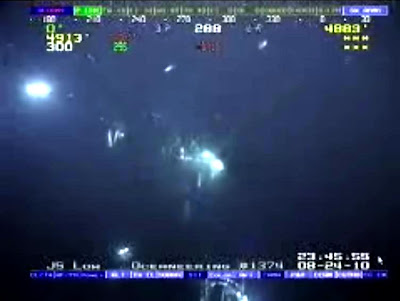Piping in D-Day
Bill Millin, piper at the D-Day landings, died on August 17th, aged 88
Aug 26th 2010
ANY reasonable observer might have thought Bill Millin was unarmed as he jumped off the landing ramp at Sword Beach, in Normandy, on June 6th 1944. Unlike his colleagues, the pale 21-year-old held no rifle in his hands. Of course, in full Highland rig as he was, he had his trusty skean dhu, his little dirk, tucked in his right sock. But that was soon under three feet of water as he waded ashore, a weary soldier still smelling his own vomit from a night in a close boat on a choppy sea, and whose kilt in the freezing water was floating prettily round him like a ballerina’s skirt.
But Mr Millin was not unarmed; far from it. He held his pipes, high over his head at first to keep them from the wet (for while whisky was said to be good for the bag, salt water wasn’t), then cradled in his arms to play. And bagpipes, by long tradition, counted as instruments of war. An English judge had said so after the Scots’ great defeat at Culloden in 1746; a piper was a fighter like the rest, and his music was his weapon. The whining skirl of the pipes had struck dread into the Germans on the Somme, who had called the kilted pipers “Ladies from Hell”. And it raised the hearts and minds of the home side, so much so that when Mr Millin played on June 5th, as the troops left for France past the Isle of Wight and he was standing on the bowsprit just about keeping his balance above the waves getting rougher, the wild cheers of the crowd drowned out the sound of his pipes even to himself.
His playing had been planned as part of the operation. On commando training near Fort William he had struck up a friendship with Lord Lovat, the officer in charge of the 1st Special Service Brigade. Not that they had much in common. Mr Millin was short, with a broad cheeky face, the son of a Glasgow policeman; his sharpest childhood memory was of being one of the “poor”, sleeping on deck, on the family’s return in 1925 from Canada to Scotland. Lovat was tall, lanky, outrageously handsome and romantic, with a castle towering above the river at Beauly, near Inverness. He had asked Mr Millin to be his personal piper: not a feudal but a military arrangement. The War Office in London now forbade pipers to play in battle, but Mr Millin and Lord Lovat, as Scots, plotted rebellion. In this “greatest invasion in history”, Lovat wanted pipes to lead the way.
He was ordering now, as they waded up Sword Beach, in that drawly voice of his: “Give us a tune, piper.” Mr Millin thought him a mad bastard. The man beside him, on the point of jumping off, had taken a bullet in the face and gone under. But there was Lovat, strolling through fire quite calmly in his aristocratic way, allegedly wearing a monogrammed white pullover under his jacket and carrying an ancient Winchester rifle, so if he was mad Mr Millin thought he might as well be ridiculous too, and struck up “Hielan’ Laddie”. Lovat approved it with a thumbs-up, and asked for “The Road to the Isles”. Mr Millin inquired, half-joking, whether he should walk up and down in the traditional way of pipers. “Oh, yes. That would be lovely.”
Three times therefore he walked up and down at the edge of the sea. He remembered the sand shaking under his feet from mortar fire and the dead bodies rolling in the surf, against his legs. For the rest of the day, whenever required, he played. He piped the advancing troops along the raised road by the Caen canal, seeing the flashes from the rifle of a sniper about 100 yards ahead, noticing only after a minute or so that everyone behind him had hit the deck in the dust. When Lovat had dispatched the sniper, he struck up again. He led the company down the main street of Bénouville playing “Blue Bonnets over the Border”, refusing to run when the commander of 6 Commando urged him to; pipers walked as they played.
He took them across two bridges, one (later renamed the Pegasus Bridge) ringing and banging as shrapnel hit the metal sides, one merely with railings which bullets whistled through: “the longest bridge I ever piped across.” Those two crossings marked their successful rendezvous with the troops who had preceded them. All the way, he learned later, German snipers had had him in their sights but, out of pity for this madman, had not fired. That was their story. Mr Millin himself knew he wasn’t going to die. Piping was too enjoyable, as he had discovered in the Boys’ Brigade band and all through his short army career. And piping protected him.
The Nut-Brown Maiden
The pipes themselves were less lucky, injured by shrapnel as he dived into a ditch. He could still play them, but four days later they took a direct hit on the chanter and the drone when he had laid them down in the grass, and that was that. The last tune they had piped on D-Day was “The Nut-Brown Maiden”, played for a small red-haired French girl who, with her folks cowering behind her, had asked him for music as he passed their farm.
He gave the pipes later to the museum at the Pegasus Bridge, which he often revisited, and sometimes piped across, during his long and quiet post-war career as a mental nurse at Dawlish in Devon. On one such visit, in full Highland rig with his pipes in his arms, he was approached by a smartly dressed woman of a certain age, with faded red hair, who planted a joyous kiss of remembrance on his cheek.












































 v
v



